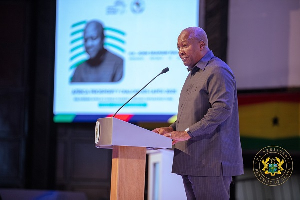Accra, Aug. 22, GNA - Mr Kwadwo Adjei-Darko, Minister of Local Government, Rural Development and Environment, on Wednesday called for the mainstreaming of climate change into all national development policies to access the full benefits that it provided in developing sustainable living.
He said studies had shown that there was a significant economic potential in the reduction of green house gas emissions in all sectors over the next two decades.
He was speaking at the second National Stakeholders' Forum on Climate Change being organized by the Environmental Protection Agency (EPA) in collaboration with the United Nations Development Programme in Accra.
The Forum seeks, among others, to raise the awareness of stakeholders, harness political support and create the necessary momentum for national action to address climate change. Mr Adjei-Darko noted that climate change was having untold effect on almost all sectors of the economy, posing a great threat to government's efforts at ensuring sustainable economic growth. He said the impact of climate change on the Ghanaian economy required that an integrated approach was used in the development of coherent national policies.
The Minister said addressing the problems of climate change called for strategies that supported both the goals of mitigation and adaptation and the goals of development, particularly in Ghana, where the economy was heavily dependent on natural resources. These strategies, he said, could include avoiding and reversing deforestation, clean energy production and use of cleaner means of transportation.
He called for urgent international cooperation to address the issue because the historical contributions to the climate change problem are lowest from developing countries.
Mr Daouda Toure, UN Resident Coordinator, noted that climate change would affect every nation and community on the planet and overcoming the problem could touch on every facet of the global economy. He said it was up to governments to introduce the mechanisms and incentives to unleash the ingenuity and creativity of the financial and technological markets in order to realize the economic, social and environmental gains to address the situation. Mr. Toure called for public policies that would promote development, deployment and diffusion of new technologies to address climate change, with the active involvement of stakeholders. These policies should include enforcement of regulations, setting of standards, provision of subsidies, financial incentives, research and development programmes and information instruments.
He said, if there measures were integrated with other government polices, climate change policies could contribute to sustainable development practices in both the developed and developing countries. Ghana's national climate change vulnerability and adaptation assessment indicated that the country is among other African countries with the lowest conversion factor of precipitation to run-off, averaging 15 per cent, meaning the country could be prone to drought. The assessment indicates that the health of millions of people in the country would be affected by global warming, particularly in regions with low adaptive capacity.
In these regions, malnutrition will increase, leading to negative impacts on the growth and development of children, with more deaths, diseases and injuries expected due to heat waves, floods, storms, fires and drought. This poses significant threat on the National health Insurance Scheme.
The assessment also indicated that there would be food insecurity due to projected decrease in maize yield by seven percent by 2020. As a result of water stress, inland fisheries would be rendered more vulnerable because of drought and habitat destruction. It also indicated that cocoa production would be severely affected as a result of decreased rainfall with correspondent decrease in soil fertility, coupled with increased temperatures and increased disease incidences.
General News of Wednesday, 22 August 2007
Source: GNA
















